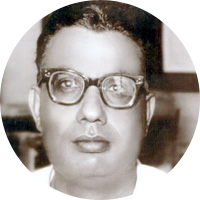ham un se agar mil baiThte hain kya dosh hamara hota hai
kuchh apni jasaarat hoti hai kuchh un ka ishara hota hai
kaTne lagi.n raate.n aa.Nkho.n me.n dekhaa nahi.n palko.n pe aksar
kabhi shaam-e-Garibaa.N ka jugnu kabhi subah ka tara hota hai
ham dil ko liye har des phire is jins kaa gaahak mil na sakaa
ai banjaaro ham log chale ham ko to Khasaaraa hotaa hai
ham apni zabaa.N se kuchh bhi kahe.n shaayar hai Khayalo.n se khele.n
aa jaao to baaham mil baiThe kabhi hijr bhi pyara hota hai
daftar se uThe kaife me.n gaye kuch sher kahe kuchh kaafi pi
puchhaa jo ma'ash kaa "Inshaajii" yuN apna guzara hota hai
Ibn-e-Insha

Ibne Insha, a renowned poet of the 20th century, mesmerized readers with his unique blend of wit, wisdom, and profound observations of life. Born on 15th June 1927 in Jalandhar, British India (now in Punjab, India), Insha's real name was Sher Muhammad Khan. However, he adopted the pen name "Ibne Insha" to pay tribute to his father, who passed away during his childhood.
Insha's literary journey began during his college years, where he developed a keen interest in writing poetry and prose. His early works showcased his wit and ability to capture the nuances of human emotions. Insha's poetry was characterized by its simplicity and accessibility, which resonated with a wide range of readers.
One of the remarkable aspects of Ibne Insha's poetry was his ability to infuse humor into his verses. His satirical and witty commentary on social and political issues made him a beloved figure among the masses. Through his clever wordplay and humorous anecdotes, he shed light on the absurdities of life, offering a fresh perspective to his audience.
In addition to his light-hearted and humorous works, Ibne Insha also delved into deeper philosophical themes. His verses reflected a profound understanding of human nature, love, and the complexities of relationships. He explored the beauty of nature, the fleeting nature of time, and the constant struggle between hope and despair.
Ibne Insha's literary contributions were not limited to poetry alone. He excelled as a travelogue writer, essayist, and translator. His travelogues were particularly popular, as he took readers on captivating journeys through various parts of the world. Insha had a unique talent for capturing the essence of a place and its people, painting vivid pictures with his words.
Throughout his illustrious career, Ibne Insha received numerous accolades and honors for his literary prowess. He was awarded the prestigious Pride of Performance Award by the Government of Pakistan in recognition of his outstanding contributions to Urdu literature.
Ibne Insha's legacy continues to live on, as his work remains cherished by readers and enthusiasts of Urdu poetry. His ability to find joy and humor in life's simplest moments and his profound observations on the human condition make him a timeless poet. Whether it is his humorous couplets or his thought-provoking verses, Ibne Insha's words continue to touch the hearts and minds of those who encounter his work.
In conclusion, Ibne Insha was a poet of unparalleled wit and wisdom, whose words continue to inspire and entertain generations of readers. His unique style, blending humor with profound insights, sets him apart as a literary icon. Ibne Insha's legacy as a master of Urdu poetry will forever be cherished, as his words continue to resonate with readers, reminding us to embrace the beauty and humor in life's journey.
kal chaudhvin ki raat thi shab bhar rahaa charchaa teraa
kuchh ne kahaa ye chaaNd hai kuchh ne kahaa chehraa teraa
ham bhi vahin maujud the ham se bhi sab puchhaa kiye
ham ha.Ns diye ham chup rahe manzuur thaa pardaa teraa
is shahar men kis se milen ham se to chhuti mahfilen
har shaKhs teraa naam le har shaKhs divaanaa teraa
kuche ko tere chhoD kar jogi hi ban jaayen magar
jangal tere parbat tere basti teri sahraa teraa
ham aur rasm-e-bandagi aashuftagi uftaadgi
ehsaan hai kya kya teraa ai husn-e-beparva teraa
do ashk jaane kis liye palkon pe aa kar Tik gaye
altaaf ki baarish terii ikraam kaa dariyaa teraa
ai bedaareG-o-be_amaa.N ham ne kabhi ki hai fuGaaN
ham ko teri vahshat sahi ham ko sahi saudaa teraa
tu bevafaa tuu maharabaaN ham aur tujh se bad-gumaaN
ham ne to puchhaa thaa zaraa ye vaqt kyuu.N Thahraa teraa
ham par ye saKhti ki nazar ham hain faqir-e-rah_guzar
rastaa kabhi rokaa teraa daaman kabhii thaamaa teraa
haaN haaN teri surat hasi.n lekin tu aisa bhi nahi.n
is shaKhs ke ashaar se shoharaa huaa kyaa kyaa teraa
beshak usi kaa dosh hai kahataa nahin Khaamosh hai
tu aap kar aisi davaa bimaar ho achchhaa teraa
bedard sunani ho to chal kahtaa hai kyaa achchhi Gazal
aashiq teraa rusavaa teraa shaayar teraa "Inshaa" teraa
Ibne Insha
